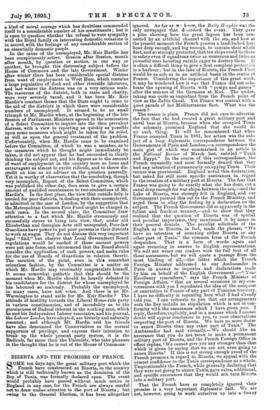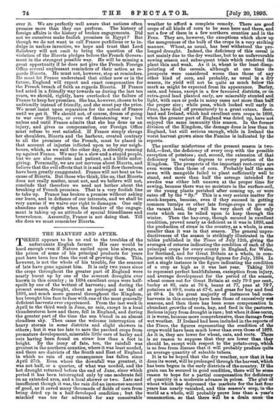BIZERTA AND THE PROMISES OF FRANCE.
Q OME ten days ago, the great military port which the French have constructed at Bizerta, in the country which is still technically known as the dominion of the Bey of Tunis, was formally declared open. The event would probably have passed without much notice in England in any case, for the French axe always careful not to draw undue attention to the port of Bizerta ; but owing to the General Election, it has been altogether ignored. As far as w know, the Daily Graphic wa3 the only newspaper that d ;scribed the ex ent. They gave a plan showing how the great lagoon has been con- nected by an artificial channel with the sea, and how at the present moment the French possess a land-locked har- bour deep enough, and big enough, to contain their whole fleet, and so strongly protected, that ten ships could lie there in safety even if squadrons twice as numerous and twice as powerful were hovering outside eager to destroy them. It is often a difficult thing to give a fleet complete protection in a harbour; but in the lake of Bizerta, the French Fleet would be as safe as in an artificial basin in the centre of France. Considering the importance of this great work, it may be wondered how it was that France did not cele- brate the opening of Bizerta with " pompa and games" after the manner of the Germans at Kiel. The under- taking was quite as important from the French point of view as the Baltic Canal. Yet France was content with a quiet parade of her Mediterranean fleet. What was the reason ?
The reason is plain. France did not care to advertise the fact that she had created a great military port and naval base at Bizerta, because when she occupied Tunis she solemnly promised England that she would do no such thing. It will be remembered that when France occupied Tunis in 1881, her action was the sub- ject of a long diplomatic correspondence between the Governments of Paris and London,—a correspondence the main gist of which was summarised in an article in the National Review of March last, entitled "Tunis and Egypt." In the course of this correspondence, the French repeatedly and most formally denied that they had any intention of permanently occupying Tunis. Their tenure was provisional. England noted this declaration, but asked for still more specific assurances in regard to the creation of a military port at Bizerta. The fear that France was going to do exactly what she has done, cut a canal deep enough for war-ships, between the sea,—and the Lake of Bizerta, was strongly felt in England, and our Government pointed this out to the French Ministry, and urged them to allay the feeling by a declaration on the subject. The French Government did so apparently in the fullest and frankest manner,—and to show that they realised that the question Of Bizerta was of special and peculiar importance, they mentioned it by name in their general denials. The peculiar solicitude of the English as to Bizerta, in fact, made the phrase, "We have no intention of annexing either Bizerte, or any other part of Tunis," the common form of the French despatches. That is a form of words again and again recurring in answer to English representations. We will not weary our readers with the full text of all these assurances, but we will quote a passage from the most binding of all,—the letter which the French Foreign Minister addressed to our Ambassador in Paris in answer to inquiries and declarations made by him on behalf of the English Government :—" Your Excellency remembers," says the French Minister of Foreign Affairs, "that on several occasions in my con- versations with you I repudiated the idea of the conquest or annexation to France of any part of Tunisian territory. I have no difficulty in repeating here what I had already told you. I can reiterate to you that our arrangements with the Bey include no stipulation which is not in con- formity with the assurances which I have given you. I reply, therefore, explicitly, and in a manner which I cannot doubt will appear conclusive to you, to your observations respecting the port of Bizerta. We have no more desire to annex Bizerta than any other part of Tunis." The Ambassador had said virtually,—We should like an assurance that you do not mean to make a permanent military port of Bizerta, and the French Foreign Office in effect replies, 'We cannot give you any stronger than that which is given by saying that we are not even going to annex Bizerte,: If this is not strong enough proof of the French promises in regard to Bizerta, we appeal with the utmost confidence to the Tunis correspondence as a whole. Unquestionably the French, while generally declaring that they were not going to annex Tunis, gave extra, additional, and specific assurances that they would not turn Bizerta into a military port.
That the French have so completely ignored their promise is a very important diplomatic fact. We are no however, going to work ourselves up into a frenzy over it. We are perfectly well aware that nations often promise more than they can perform. The history of foreign affairs is the history of broken engagements. Did not we ourselves make foolish promises in Egypt ? But though we do not want to call France perfidious or to in- dulge in useless invective, we hope and trust that Lord Salisbury will not omit to bring the question of the violation of the Bizerte pledges before the French Govern- ment in the strongest possible way. He will be missing a great opportunity if he does not give the French Foreign Office several unpleasant reminders of their action as re- gards Bizerte. He must not, however, stop at reminders. He must let France understand that either now or in the future, England will expect and exact compensation for the French breach of faith as regards Bizerte. If France had acted in a friendly way towards us during the last ten years, we should, rightly, have overlooked the failure of France to keep her promises. She has, however, chosen to be unfriendly instead of friendly, and she must pay the price. We must insist upon reparation for the action of France until we get it. We should not, of course, dream of going to war over Bizerte, or even of threatening war ; but unless and until France admits that she has done us an injury, and gives us compensation, our Foreign Office must refuse to rest satisfied. If France simply shrugs her shoulders, Bizerta and the harbour, created contrary to all the promises of the French, must be placed in that account of injuries inflicted upon us by our neigh- bours, which, as we said the other day, is silently running up against France. We may be a slow and a stupid people, but we are also resolute and patient, and a little unfor- giving. Personally, we are not nervous about Bizerta, and believe that the evil effects that it is said will flow therefrom have been greatly exaggerated. France will not beat us be- cause of Bizerte. But those who think, like us, that Bizerte does not really matter, must not, and we believe will not, conclude that therefore we need not bother about the breaking of French promises. That is a very foolish line to take up. France has broken a promise without asking our leave, and in defiance of our interests, and we shall be very unwise if we waive our right to damages. One only abandons such rights when the breaker of the engage- ment is taking up an attitude of special friendliness and benevolence. Assuredly, France is not doing that. Till she does we must remember Bizerta.



































 Previous page
Previous page